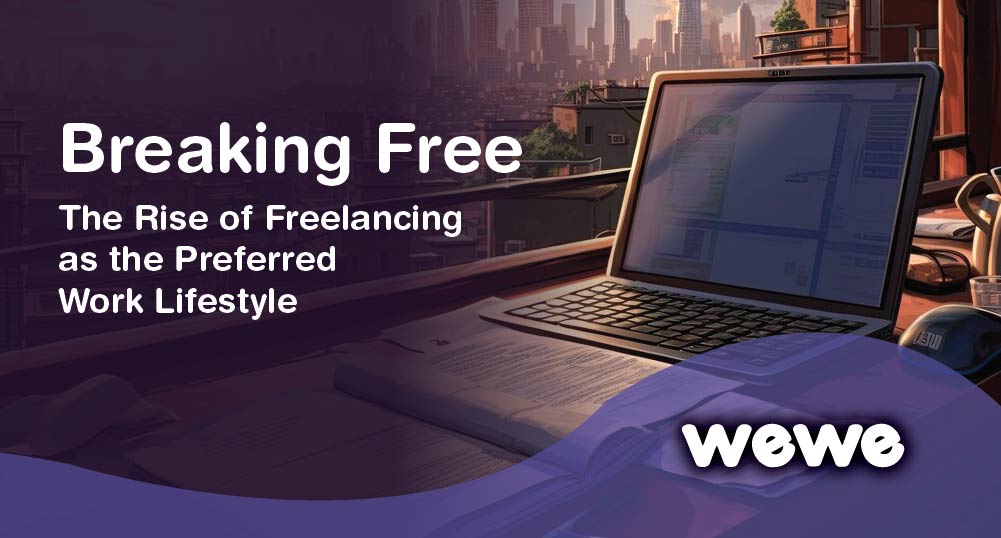
In the dynamic landscape of today’s professional world, a significant shift is taking place, challenging the traditional 9-5 work structure. Freelancing is the go-to choice for individuals seeking flexibility, autonomy, and a break from the conventional office routine. In this blog post, we’ll explore the reasons behind the growing popularity of freelancing and why more people are choosing this alternative path over the traditional 9-5 grind.

Flexibility Redefined
One of the primary attractions of freelancing is the unparalleled flexibility it offers. Traditional office hours are becoming increasingly outdated as freelancers enjoy the freedom to set their schedules. Whether working late or taking a midday break, freelancers can structure their workday to suit their personal preferences and peak productivity hours.
This flexibility is particularly beneficial for those with diverse lifestyles, such as parents juggling childcare responsibilities or individuals pursuing side projects and passions. The ability to adapt working hours to personal circumstances is a driving force behind the growing appeal of freelancing.

Global Opportunities
Geographical constraints no longer bind freelancers. Thanks to the rise of digital platforms, individuals can connect with clients and collaborators worldwide. This global reach broadens the pool of potential clients and exposes freelancers to diverse projects and perspectives, enriching their professional experience.
The digital age has facilitated a seamless exchange of ideas, skills, and services, transcending borders. This global networking aspect enables freelancers to access many opportunities that might not be available in their local job market. It’s not just about working for international clients; it’s about embracing a global mindset and expanding one’s professional horizons.

Skill Specialization
In the traditional 9-5 model, employees are often required to wear multiple hats. Freelancing, however, allows individuals to focus on their specific skills and passions. This specialisation enhances the quality of work and enables freelancers to become experts in their niche, attracting clients who value their unique expertise.
Clients are increasingly seeking specialised skills to address their specific needs, and freelancers, by honing in on their strengths, freelancers can provide expertise that may be lacking in more generalised roles. This focus on specialisation benefits freelancers in terms of job satisfaction and contributes to the quality of work in the freelance ecosystem.

Work-Life Integration
Freelancing promotes a healthier work-life balance. The distinction between work and personal life becomes more fluid, allowing them to integrate their professional and personal commitments seamlessly sonal commitments. This flexibility reduces stress and burnout, ultimately leading to increased job satisfaction.
Setting one’s hours and work environment enables freelancers to tailor their workdays to match their energy levels and personal preferences. This integration of work and life fosters a sense of control and fulfilment, positively impacting mental well-being. It’s not just about escaping the traditional 9-5; it’s about designing a lifestyle that aligns with individual needs and priorities.

Economic Empowerment
Freelancers have the potential to diversify their income streams by taking on multiple projects simultaneously. This economic empowerment provides financial security that may be elusive in a traditional 9-5 job. Freelancers can also set their rates based on the value they provide, potentially earning more than they would in a fixed salary position.
The gig economy has reshaped the concept of job security, and freelancers are leveraging their skills in a competitive market. The ability to negotiate rates, take on various projects, and build a diverse portfolio empowers freelancers to navigate economic uncertainties more effectively. This financial autonomy is why many individuals choose freelancing over traditional employment.

Technology Facilitation
Advancements in technology have played a pivotal role in the rise of freelancing. Collaborative tools, project management platforms, and communication apps have made it easier than ever for freelancers to work remotely and stay connected with clients and collaborators. This tech-driven environment aligns perfectly with the digital age and encourages the freelance lifestyle.
The widespread availability of high-speed internet, cloud-based storage, and communication tools has eliminated the barriers that once limited remote work. Freelancers can seamlessly collaborate with clients and team members, regardless of geographical distances. Technology facilitates efficient work processes and contributes to the overall appeal of freelancing as a modern and adaptable work model.

As the professional landscape transforms, freelancing emerges as a beacon of change. The freedom, flexibility, and opportunities of freelancing reshape how people approach work. The traditional 9-5 model is no longer the only path to professional success, and freelancing is not just a trend but a transformative movement, offering a new and exciting way to navigate the world of work. Embracing the freelance lifestyle goes beyond escaping the constraints of a fixed schedule; it’s about unlocking a world of professional and personal possibilities.
